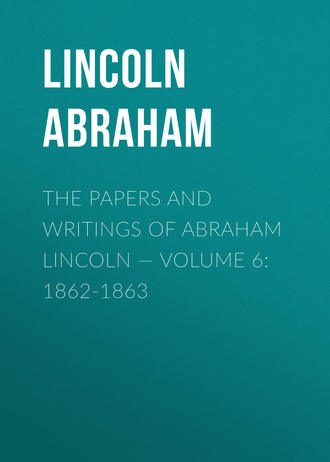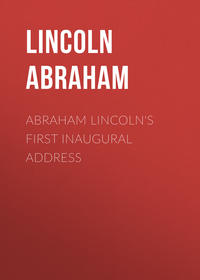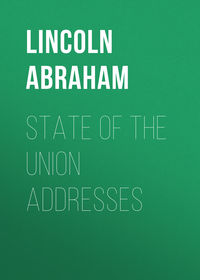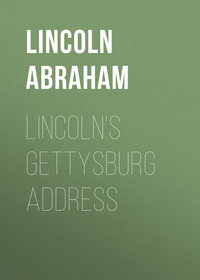 полная версия
полная версияThe Papers And Writings Of Abraham Lincoln — Volume 6: 1862-1863
It now appears that Banks got safely into Winchester last night, and is this morning retreating on Harper's Ferry. This justifies the inference that he is pressed by numbers superior to his own. I think it not improbable that Ewell, Jackson, and Johnson are pouring through the gap they made day before yesterday at Front Royal, making a dash northward. It will be a very valuable and very honorable service for General McDowell to cut them off. I hope he will put all possible energy and speed into the effort.
A. LINCOLN.
TELEGRAM TO GENERAL R. SAXTON
WAR DEPARTMENT, May 25, 1862GENERAL SAXTON, Harper's Ferry:
If Banks reaches Martinsburg, is he any the better for it? Will not the enemy cut him from thence to Harper's Ferry? Have you sent anything to meet him and assist him at Martinsburg? This is an inquiry, not an order.
A. LINCOLN.
TELEGRAM TO GENERAL R. SAXTON
WAR DEPARTMENT, May 25, 1862. 6.30 P.MGENERAL SAXTON, Harper's Ferry:
One good six-gun battery, complete in its men and appointments, is now on its way to you from Baltimore. Eleven other guns, of different sorts, are on their way to you from here. Hope they will all reach you before morning. As you have but 2500 men at Harper's Ferry, where are the rest which were in that vicinity and which we have sent forward? Have any of them been cut off?
A. LINCOLN.
TELEGRAM TO GENERAL R. SAXTON
WAR DEPARTMENT, May 25, 1862GENERAL SAXTON, Harper's Ferry:
I fear you have mistaken me. I did not mean to question the correctness of your conduct; on the contrary! I approve what you have done. As the 2500 reported by you seemed small to me, I feared some had got to Banks and been cut off with him. Please tell me the exact number you now have in hand.
A. LINCOLN.
TELEGRAM TO GENERAL G. B. McCLELLAN
[Sent in cipher.]WAR DEPARTMENT, WASHINGTON CITY, D. C., May 25,1862. 8.30 P.M.
MAJOR-GENERAL McCLELLAN:
Your despatch received. General Banks was at Strasburg, with about 6,000 men, Shields having been taken from him to swell a column for McDowell to aid you at Richmond, and the rest of his force scattered at various places. On the 23d a rebel force of 7000 to 10,000 fell upon one regiment and two companies guarding the bridge at Front Royal, destroying it entirely; crossed the Shenandoah, and on the 24th (yesterday) pushed to get north of Banks, on the road to Winchester. Banks ran a race with them, beating them into Winchester yesterday evening. This morning a battle ensued between the two forces, in which Banks was beaten back into full retreat toward Martinsburg, and probably is broken up into a total rout. Geary, on the Manassas Gap railroad, just now reports that Jackson is now near Front Royal, With 10,000, following up and supporting, as I understand, the forces now pursuing Banks, also that another force of 10,000 is near Orleans, following on in the same direction. Stripped here, as we are here, it will be all we can do to prevent them crossing the Potomac at Harper's Ferry or above. We have about 20,000 of McDowell's force moving back to the vicinity of Front Royal, and General Fremont, who was at Franklin, is moving to Harrisonburg; both these movements intended to get in the enemy's rear.
One more of McDowell's brigades is ordered through here to Harper's Ferry; the rest of his force remains for the present at Fredericksburg. We are sending such regiments and dribs from here and Baltimore as we can spare to Harper's Ferry, supplying their places in some sort by calling in militia from the adjacent States. We also have eighteen cannon on the road to Harper's Ferry, of which arm there is not a single one yet at that point. This is now our situation.
If McDowell's force was now beyond our reach, we should be utterly helpless. Apprehension of something like this, and no unwillingness to sustain you, has always been my reason for withholding McDowell's force from you. Please understand this, and do the best you can with the force you have.
A. LINCOLN.
HISTORY OF CONSPIRACY OF REBELLION
MESSAGE TO CONGRESSMAY 16, 1862 TO THE SENATE AND HOUSE OF REPRESENTATIVES:
The insurrection which is yet existing in the United States and aims at the overthrow of the Federal Constitution and the Union, was clandestinely prepared during the Winter of 1860 and 1861, and assumed an open organization in the form of a treasonable provisional government at Montgomery, in Alabama on the 18th day of February, 1861. On the 12th day of April, 1861, the insurgents committed the flagrant act of civil war by the bombardment and the capture of Fort Sumter, Which cut off the hope of immediate conciliation. Immediately afterward all the roads and avenues to this city were obstructed, and the capital was put into the condition of a siege. The mails in every direction were stopped and the lines of telegraph cut off by the insurgents, and military and naval forces which had been called out by the government for the defense of Washington were prevented from reaching the city by organized and combined treasonable resistance in the State of Maryland. There was no adequate and effective organization for the public defense. Congress had indefinitely adjourned. There was no time to convene them. It became necessary for me to choose whether, using only the existing means, agencies, and processes which Congress had provided, I should let the government fall at once into ruin or whether, availing myself of the broader powers conferred by the Constitution in cases of insurrection, I would make an effort to save it, with all its blessings, for the present age and for posterity.
I thereupon summoned my constitutional advisers, the heads of all the departments, to meet on Sunday, the 20th day of April, 1861, at the office of the Navy Department, and then and there, with their unanimous concurrence, I directed that an armed revenue cutter should proceed to sea to afford protection to the commercial marine, and especially the California treasure ships then on their way to this coast. I also directed the commandant of the navy-yard at Boston to purchase or charter and arm as quickly as possible five steamships for purposes of public defense. I directed the commandant of the navy-yard at Philadelphia to purchase or charter and arm an equal number for the same purpose. I directed the commandant at New York to purchase or charter and arm an equal number. I directed Commander Gillis to purchase or charter and arm and put to sea two other vessels. Similar directions were given to Commodore Dupont, with a view to the opening of passages by water to and from the capital. I directed the several officers to take the advice and obtain the aid and efficient services, in the matter, of his Excellency Edwin D. Morgan, the Governor of New York, or in his absence George D. Morgan, William M. Evarts, R. M. Blatchford, and Moses H. Grinnell, who were by my directions especially empowered by the Secretary of the Navy to act for his department in that crisis in matters pertaining to the forwarding of troops and supplies for the public defense.
The several departments of the government at that time contained so large a number of disloyal persons that it would have been impossible to provide safely through official agents only for the performance of the duties thus confided to citizens favorably known for their ability, loyalty, and patriotism.
The several orders issued upon these occurrences were transmitted by private messengers, who pursued a circuitous way to the seaboard cities, inland across the States of Pennsylvania and Ohio and the northern lakes. I believe by these and other similar measures taken in that crisis, some of which were without any authority of law, the government was saved from overthrow. I am not aware that a dollar of the public funds thus confided without authority of law to unofficial persons was either lost or wasted, although apprehensions of such misdirection occurred to me as objections to those extraordinary proceedings, and were necessarily overruled.
I recall these transactions now because my attention has been directed to a resolution which was passed by the House of Representatives on the 30th day of last month, which is in these words:
"Resolved, That Simon Cameron, late Secretary of War by investing Alexander Cummings with the control of large sums of the public money and authority to purchase military supplies without restriction, without requiring from him any guaranty for the faithful performance of his duties, when the services of competent public officers were available, and by involving the government in a vast number of contracts with persons not legitimately engaged in the business pertaining to the subject-matter of such contracts, especially in the purchase of arms for future delivery, has adopted a policy highly injurious to the public service, and deserves the censure of the House."
Congress will see that I should be wanting equally in candor and in justice if I should leave the censure expressed in this resolution to rest exclusively or chiefly upon Mr. Cameron. The same sentiment is unanimously entertained by the heads of department who participated in the proceedings which the House of Representatives have censured. It is due to Mr. Cameron to say that although he fully approved the proceedings they were not moved nor suggested by himself, and that not only the President, but all the other heads of departments, were at least equally responsible with him for whatever error, wrong, or fault was committed in the premises.
A. LINCOLN.
TELEGRAM TO GENERAL G. B. McCLELLAN
WASHINGTON, May 26, 1862. 12.40MAJOR-GENERAL McCLELLAN:
We have General Banks's official report. He has saved his army and baggage, and has made a safe retreat to the river, and is probably safe at Williamsport. He reports the attacking force at 15,000.
A. LINCOLN, President.
TELEGRAM TO GENERAL I. McDOWELL
WAR DEPARTMENT, May 26, 1862. 1 P.MMAJOR-GENERAL McDOWELL, Falmouth, Virginia:
Despatches from Geary just received have been sent you. Should not the remainder of your forces, except sufficient to hold the point at Fredericksburg, move this way — to Manassas Junction or Alexandria? As commander of this department, should you not be here? I ask these questions.
A. LINCOLN.
TELEGRAM TO GENERAL McCLELLAN
WASHINGTON, May 26, 1862MAJOR-GENERAL GEORGE B. McCLELLAN:
Can you not cut the Alula Creek railroad? Also, what impression have you as to intrenched works for you to contend with in front of Richmond? Can you get near enough to throw shells into the city?
A. LINCOLN, President.
TELEGRAM TO GENERAL J. C. FREMONT
May 27.1862. 9.58 P.MMAJOR-GENERAL FREMONT:
I see that you are at Moorefield. You were expressly ordered to march to Harrisonburg. What does this mean?
A. LINCOLN.
TELEGRAM FROM SECRETARY STANTON TO GOVERNOR ANDREW
WASHINGTON, May 27, 1862GOVERNOR ANDREW, Boston:
The President directs that the militia be relieved, and the enlistments made for three years, or during the war. This, I think, will practically not be longer than for a year. The latest intelligence from General Banks states that he has saved nearly his whole command with small loss.
Concentrations of our force have been made, which it is hoped will capture the enemy.
EDWIN M. STANTON, Secretary of War.
TELEGRAM FROM SECRETARY STANTON TO GENERAL J. C. FREMONT,
WASHINGTON, May 28, 1862MAJOR-GENERAL FREMONT, Moorefield
The President directs you to halt at Moorefield and await orders, unless you hear of the enemy being in the general direction of Rodney, in which case you will move upon him. Acknowledge the receipt of this order, and the hour it is received.
EDWIN M. STANTON, Secretary of War.
TELEGRAM TO GENERAL I. McDOWELL
WASHINGTON, May 28, 1862GENERAL McDOWELL, Manassas Junction:
General McClellan at 6.30 P.M. yesterday telegraphed that Fitz-John Porter's division had fought and driven 13,000 of the enemy, under General Branch, from Hanover Court-House, and was driving them from a stand they had made on the railroad at the time the messenger left. Two hours later he telegraphed that Stoneman had captured an engine and six cars on the Virginia Central, which he at once sent to communicate with Porter. Nothing further from McClellan.
If Porter effects a lodgment on both railroads near Hanover Court-House, consider whether your forces in front of Fredericksburg should not push through and join him.
A. LINCOLN.
TELEGRAM TO GENERAL G. B. McCLELLAN
WASHINGTON, May 28, 1862MAJOR-GENERAL McCLELLAN:
What of F.J. Porter's expedition? Please answer.
A. LINCOLN.
TELEGRAM TO GENERAL I. McDOWELL
WASHINGTON. May 28, 1862. 4 P.MGENERAL McDOWELL, Manassas Junction:
You say General Geary's scouts report that they find no enemy this side of the Blue Ridge. Neither do I. Have they been to the Blue Ridge looking for them.
A. LINCOLN.
TELEGRAM TO GENERAL I. McDOWELL
WASHINGTON, May 28, 1862. 5.40 P.MGENERAL McDOWELL, Manassas Junction:
I think the evidence now preponderates that Ewell and Jackson are still about Winchester. Assuming this, it is for you a question of legs. Put in all the speed you can. I have told Fremont as much, and directed him to drive at them as fast as possible. By the way, I suppose you know Fremont has got up to Moorefield, instead of going into Harrisonburg.
A. LINCOLN.
TELEGRAM TO GENERAL G. B. McCLELLAN
WASHINGTON May 28, 1862. 8.40 P.MMAJOR-GENERAL McCLELLAN:
I am very glad of General F. J. Porter's victory. Still, if it was a total rout of the enemy, I am puzzled to know why the Richmond and Fredericksburg railroad was not seized again, as you say you have all the railroads but the Richmond and Fredericksburg. I am puzzled to see how, lacking that, you can have any, except the scrap from Richmond to West Point. The scrap of the Virginia Central from Richmond to Hanover Junction, without more, is simply nothing. That the whole of the enemy is concentrating on Richmond, I think cannot be certainly known to you or me. Saxton, at Harper's Ferry informs us that large forces, supposed to be Jackson's and Ewells, forced his advance from Charlestown today. General King telegraphs us from Fredericksburg that contrabands give certain information that 15,000 left Hanover Junction Monday morning to reinforce Jackson. I am painfully impressed with the importance of the struggle before you, and shall aid you all I can consistently with my view of due regard to all points.
A. LINCOLN.
TELEGRAM FROM SECRETARY STANTON TO GENERAL FREMONT
WASHINGTON, May 28, 1862MAJOR-GENERAL JOHN C. FREMONT, Moorefield:
The order to remain at Moorefield was based on the supposition that it would find you there.
Upon subsequent information that the enemy were still operating in the vicinity of Winchester and Martinsburg, you were directed to move against the enemy.
The President now again directs you to move against the enemy without delay. Please acknowledge the receipt of this, and the time received.
EDWIN M. STANTON, Secretary of War.
TELEGRAM TO GENERAL MARCY
WASHINGTON, May 29, 1862. 10 A.MGENERAL R. B. MARCY, McClellan's Headquarters:
Yours just received. I think it cannot be certainly known whether the force which fought General Porter is the same which recently confronted McDowell. Another item of evidence bearing on it is that General Branch commanded against Porter, while it was General Anderson who was in front of McDowell. He and McDowell were in correspondence about prisoners.
A. LINCOLN.
TELEGRAM TO GENERAL G. B. McCLELLAN
WAR DEPARTMENT, WASHINGTON CITY, D. C., May 29, 1862. 10.30 A.MMAJOR-GENERAL McCLELLAN:
I think we shall be able within three days to tell you certainly whether any considerable force of the enemy — Jackson or any one else — is moving on to Harper's Ferry or vicinity. Take this expected development into your calculations.
A. LINCOLN.
TELEGRAM TO GENERAL N. P. BANKS
WASHINGTON, May 29, 1862MAJOR-GENERAL BANKS, Williamsport, Maryland:
General McDowell's advance should, and probably will, be at or near Front Royal at twelve (noon) tomorrow. General Fremont will be at or near Strasburg as soon. Please watch the enemy closely, and follow and harass and detain him if he attempts to retire. I mean this for General Saxton's force as well as that immediately with you.
A. LINCOLN.
TELEGRAM TO GENERAL FREMONT
WASHINGTON, May 29, 1862. 12 MMAJOR-GENERAL FREMONT, Moorefield, Virginia:
General McDowell's advance, if not checked by the enemy, should, and probably will, be at Front Royal by twelve (noon) to-morrow. His force, when up, will be about 20,000. Please have your force at Strasburg, or, if the route you are moving on does not lead to that point, as near Strasburg as the enemy may be by the same time. Your despatch No.30 received and satisfactory.
A. LINCOLN.
TELEGRAM TO GENERAL I. McDOWELL
WASHINGTON, May 29, 1862MAJOR-GENERAL McDOWELL, Manassas Junction:
General Fremont's force should, and probably will, be at or near Strasburg by twelve (noon) tomorrow. Try to have your force, or the advance of it, at Front Royal as soon.
A. LINCOLN.
TELEGRAM TO GENERAL MARCY
WASHINGTON, May 29, 1862. 1.20 P.MGENERAL R. B. MARCY:
Your despatch as to the South Anna and Ashland being seized by our forces this morning is received. Understanding these points to be on the Richmond and Fredericksburg railroad, I heartily congratulate the country, and thank General McClellan and his army for their seizure.
A. LINCOLN.
TELEGRAM TO GENERAL I. McDOWELL
WASHINGTON, May 30, 1862. 10 A.MMAJOR-GENERAL McDOWELL, Manassas Junction:
I somewhat apprehend that Fremont's force, in its present condition, may not be quite strong enough in case it comes in collision with the enemy. For this additional reason I wish you to push forward your column as rapidly as possible. Tell me what number your force reaching Front Royal will amount to.
A. LINCOLN.
TELEGRAM TO GENERAL N. P. BANKS
WASHINGTON, May 30, 1862. 10.15 A.MMAJOR-GENERAL BANKS,
Williamsport, Maryland, via Harper's Ferry:
If the enemy in force is in or about Martinsburg, Charlestown, and Winchester, Or any or all of them, he may come in collision with Fremont, in which case I am anxious that your force, with you and at Harper's Ferry, should so operate as to assist Fremont if possible; the same if the enemy should engage McDowell. This was the meaning of my despatch yesterday.
A. LINCOLN.
TELEGRAM TO GENERAL I. McDOWELL
WASHINGTON, May 30, 1862. 12.40MAJOR-GENERAL McDOWELL, Rectortown:
Your despatch of to-day received and is satisfactory. Fremont has nominally 22,000, really about 17,000. Blenker's division is part of it. I have a despatch from Fremont this morning, not telling me where he is; but he says:
"Scouts and men from Winchester represent Jackson's force variously at 30,000 to 60,000. With him Generals Ewell and Longstreet."
The high figures erroneous, of course. Do you know where Longstreet is? Corinth is evacuated and occupied by us.
A. LINCOLN.
TELEGRAM TO GENERAL FREMONT
WASHINGTON, May 30, 1862. 2.30 P.MMAJOR-GENERAL FREMONT, Moorefield, Virginia:
Yours, saying you will reach Strasburg or vicinity at 5 P.M. Saturday, has been received and sent to General McDowell, and he directed to act in view of it. You must be up to the time you promised, if possible.
Corinth was evacuated last night, and is occupied by our troops to-day; the enemy gone south to Okolotia, on the railroad to Mobile.
A. LINCOLN.
TELEGRAM TO GENERAL I. McDOWELL
WAR DEPARTMENT WASHINGTON CITY, May 30, 1862.9.30 P.MMAJOR-GENERAL McDOWELL, Rectortown, Va.:
I send you a despatch just received from Saxton at Harper's Ferry: "The rebels are in line of battle in front of our lines. They have nine pieces of artillery, and in position, and cavalry. I shelled the woods in which they were, and they in return threw a large number of shells into the lines and tents from which I moved last night to take up a stronger position. I expect a great deal from the battery on the mountain, having three 9 inch Dahlgren bearing directly on the enemy's approaches. The enemy appeared this morning and then retired, with the intention of drawing us on. I shall act on the defensive, as my position is a strong one. In a skirmish which took place this afternoon I lost one horse, The enemy lost two men killed and seven wounded.
"R. SAXTON, Brigadier General."
It seems the game is before you. Have sent a copy to General Fremont.
A. LINCOLN.
TELEGRAM TO GENERAL G. B. McCLELLAN
WASHINGTON, May 31, 1862. 10.20 PMMAJOR-GENERAL McCLELLAN:
A circle whose circumference shall pass through Harper's Ferry, Front Royal, and Strasburg, and whose center shall be a little northeast of Winchester, almost certainly has within it this morning the forces of Jackson, Ewell, and Edward Johnson. Quite certainly they were within it two days ago. Some part of their forces attacked Harper's Ferry at dark last evening, and are still in sight this morning. Shields, with McDowell's advance, retook Front Royal at 11 A.M. yesterday, with a dozen of our own prisoners taken there a week ago, 150 of the enemy, two locomotives, and eleven cars, some other property and stores, and saved the bridge.
General Fremont, from the direction of Moorefield, promises to be at or near Strasburg at 5 P.M. to-day. General Banks at Williamsport, with his old force and his new force at Harper's Ferry, is directed to co-operate. Shields at Front Royal reports a rumor of still an additional force of the enemy, supposed to be Anderson's, having entered the valley of Virginia. This last may or may not be true. Corinth is certainly in the hands of General Halleck.
A. LINCOLN.
TELEGRAM FROM SECRETARY STANTON
TO GENERAL G. A. McCALL, WASHINGTON, May 31, 1562GENERAL McCALL:









